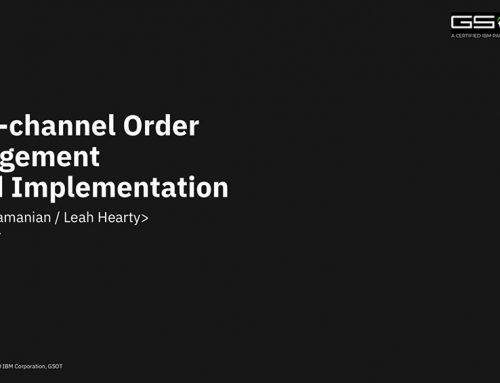Importance of a robust OMS highlighted by COVID
Order Management – a critical consideration for Retail today
How COVID has demonstrated the need for flexible order management
The far-flung travel, the bucket lists we had of places to visit, the adventures we wanted to go on……all of it has to wait, potentially until 2021. “House arrest” and figuring out how to do everything from home is the current modus operandi for everyone, regardless of age, occupation or location.
We all know that the world has turned on its head. Social distancing and ‘lockdown’ are the new normal – with people across the globe trying to adjust and get accustomed to the impact of COVID-19.
If major incidents from the past are anything to go by, we can assume that some of the current restrictions and changes in public behavior will continue well into the future. For example, anyone saving for a deposit to buy a property now, can attest that the more stringent lending measures put in place following the global financial crisis of 2007 can still be keenly felt today. Likewise, additional security measures introduced at airports following foiled terrorist attacks have become largely common place around the world and show no signs of going anywhere.
Let’s take a look at some of the changes brought about by this global pandemic that may be here to stay, and that are likely to impact retailers and how they manage the selling process:
- A rise in online shopping from a new demographic
Those in the older age range are deemed to be more at risk to the virus and have been encouraged to stay indoors as much as possible. Over the last few weeks we have seen many supermarkets reserving their online delivery slots just for people marked in the vulnerable category. This has pushed a demographic of shoppers usually more familiar with in store purchases into the online space. It seems likely that going forward many of these new customers will continue to avail themselves of the convenience of online shopping – and beyond just grocery.
- Greater mindfulness of crowded places and a desire to social distance where possible
Those bone crushing, packed together Black Friday sales seem a lot less appealing in this climate. Even once the high street is fully reopen, customers may take some time to feel confident remerging into public spaces. Having been made quickly available by grocery and food delivery, services like contactless delivery may well be offerings that people want to keep beyond the current crisis and take into other retail verticals.
- Even greater pressure on retailers to sell through stock at full price, and avoid markdown
Aside from those marked in the ‘Essential’ category, retailers across the board have taken a huge blow, which many will sadly not survive. For those who do continue online and in bricks and mortar stores, the heat is really on to claw back the losses from missed sales. It is imperative they can sell stock quickly and from the best locations to ensure the hit of markdown is avoided.
What impact these trends will have on retailers:
There are likely to be three primary impacts of the retail sector as we know it:
- Online orders will increase
- Customers will demand additional services and flexibility from retailers
- Retailers will need an optimal & flexible fulfilment offering to ensure survival.
More than ever before a robust Order Management System is important. As lockdown is slowly lifted, services will restart, but inconsistently and with short notice. Logistics and delivery is likely to be extended beyond groceries and food, opening up opportunities in other retail formats such as apparel, electronics, footwear, gifts and many others.
What does Order Management enable for these retailers?
Let’s consider the importance of Order Management, and the expected challenges for those who have not yet invested in a strong OMS:
- Retailers that already have an OMS and provide buy-online:pick-up in store, store fulfilment, and other flexible fulfilment options are in a prime position to retain current customers and recruit new ones. Customers will prefer frictionless order fulfilment, and prior experience in this will benefit such retailers. However new customers might also mean new order volumes that require Store and DC operations to scale, which may require new configurations.
- If store inventory was not used for fulfilment previously, it becomes imperative now as store footfall has plummeted. A single pool of inventory will be key. Additionally, there will already be a pool of old orders that need to be triaged. Retailers will need to determine if the customer is still interested in getting it delivered, or if they have to cancel. An OMS with user controlled single and bulk order cancellation functionality will be needed to do this seamlessly.
- For Retailers that do not have ecommerce fulfilment but only a storefront to browse products, the question becomes; how quickly can they get an omni channel OMS solution in place? Implementing a proven OMS with standard industry practices will get you out of the door – it is a survival question now, rather than a differentiator. To get an initial foothold in the market just requires the ability to get the order shipped and delivered, no frills needed. (Bells and whistles can come later). This capability needs to be leveraged fast, in weeks, not months.
- Retailers that sell only on marketplaces – It may also be time to re-evaluate the dependency on marketplaces. Given that most marketplaces have in-house brands, what leverage do retailers have to make the marketplace sell their brands over in-house? Is deep discounting and promotions on marketplaces a sound business decision now? Are such retailers better off with their own ecommerce and order fulfilment? Certainly, this trend has been seen with some of the large US retailers – moving back to own Ecommerce from marketplaces.
With the future still uncertain, retailers should look for flexible solutions with easy onboard and off-board capability. Omni Channel Order Management solutions completely managed in the Cloud, with industry standard guarantees for uptime and availability are the best choice for survival. This unprecedented situation imparts a steep change and learning curve, and retailers too, will need to adjust to the new normal. OMS is now a necessity, not an option.
If you’re interested in a friendly, no obligation chat to learn more about setting up true omni-channel capabilities for your business in a matter of weeks rather than months, please contact us at sales@gsot-web.icebluesky-test.co.uk or come along to our talk to find out more.






Leave A Comment